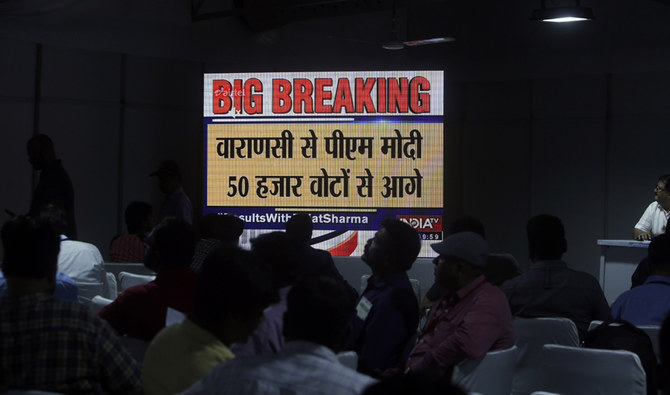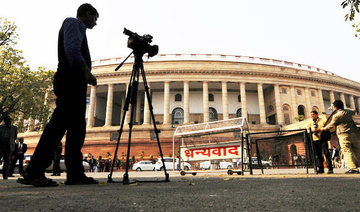NEW DELHI: After strong resistance from the southern Indian states, especially Tamil Nadu, the Indian government on Monday revised a controversial draft bill that proposed to make Hindi a mandatory third language to be taught in schools across India.
The government said in a statement on Monday that “flexibility in the choice of languages” in schools has been changed, omitting any reference to teaching Hindi to non-Hindi states.
The draft bill released on May 31 by the Human Resources Development Minister Ramesh Pokhriyal Nishank was one of the recommendations for a new national education policy that intended to have a three-language formula in schools, a departure from the existing two-language set-up.
It proposed to teach in the Hindi-speaking north Indian states a modern Indian language besides Hindi and English. However, in non-Hindi speaking states, which comprise mostly east, northeast, west and south India, Hindi learning was proposed to be made mandatory besides a regional language and English.
There was a a huge political outcry in Tamil Nadu within hours of the release of the draft bill with most of the political parties, including the ruling All India Anna Dramuk Munnetra Kazhagam (AIADMK), a regional ally of New Delhi’s ruling party, Bharatiya Janata Party (BJP), strongly objecting to changing the existing two-language formula.
Resistance was also visible on social media with many in south India launching the hashtag #HindinottheNationallanguage.
A Twitter handle called “1000 friends of South” wrote: “The BJP government’s real face is beginning to emerge ... Hindi is being imposed on South Indians. Tamil Nadu has rebelled against BJP-Govt. Let’s join them to fight the imposition of Hindi!”
On Monday, after the tweak of the draft bill, popular India musician and composer A.R. Rahman tweeted: “Beautiful solution. Hindi is not compulsory in Tamil Nadu … draft has been rectified.”
A. Saravanan, of Dravida Munnetra Kazhagam (DMK), a powerful regional party of Tamil Nadu, said: “The BJP government, which caters to Hindi states, doesn’t believe in pluralism.”
Saravanan told Arab News: “We believe in the concept of unity in diversity but they believe in uniformity. The strength of India lies in diversity and pluralism. By imposing Hindi on non-Hindi speaking states, the BJP wants to consolidate the Hindi-speaking vote banks.”
He added: “What was the need to bring in a three-language policy when a two-language policy was working fine? If someone wants to study Hindi instead of Tamil then that option is available under the two-language formula. Why impose Hindi on students?”
Kovai Sathyan, of the ruling AIADMK in Tamil Nadu, said: “There should not have been so much protest over a draft bill.”
Sathyan, a spokesperson for AIADMK, a regional ally of the BJP, added: “Education is in the hands of the state and the center cannot impose any law on education on the state. So those opposing the draft bill are overreacting. We are committed to maintaining a two-language policy.”
Sathyan told Arab News: “A country like India cannot have one official language.”
H.D. Kumaraswamy, the chief minister of Karnataka, one of the five south Indian states, said: “One language should not be imposed on others for any reason in the name of a three-language policy.”
Raj Thackeray, a regional leader of the western state of Maharashtra, said: “Hindi is not our mother tongue, do not enforce it on us and incite us.”
Faced with the protests, New Delhi went in for damage control on Sunday with two of its ministers — Finance Minister Nirmala Sitharaman and the Foreign Minister S. Jaishankar — issuing a statement on Sunday saying that “the draft will be reviewed before implementation.”
In 1965, Tamil Nadu faced violent protests when the center proposed to make Hindi India’s only official language.
The people of Tamil Nadu are proud of their language, Tamil, which is considered the most ancient language of the Indian subcontinent. The politics in the state centers around the Dravidian movement, which worships the Tamil language and literature, and any attempt to promote another language becomes a highly emotional issue.
According to the 2011 census, about 44 percent of the Indian population speaks Hindi, making it one of the most widely spoken languages in the country.
India does not have a national language but designates 22 languages as official languages. Hindi and English are among the official languages of India and they are widely spoken.
N. Sathiya Moorthy, of the think tank Observer Research Foundation (ORF), said: “The controversy was totally avoidable but the timing seems to have been motivated yet miscalculated.”
Moorthy added: “If the central ministers Jaishankar and Nirmala Sitharaman say that there will be consultations then why you are not going ahead with consultations straightway without kicking up a controversy?”
He told Arab News that the BJP was trying to test the waters in South India and “that way it is trying to find a new element to consolidate the Hindi heartland.”
In the recently held elections, the BJP could not open its account in three of five south Indian states. Traditionally the party is known as a north Indian phenomenon with its base coming from the Hindi-speaking population in the north and west of the country.



























